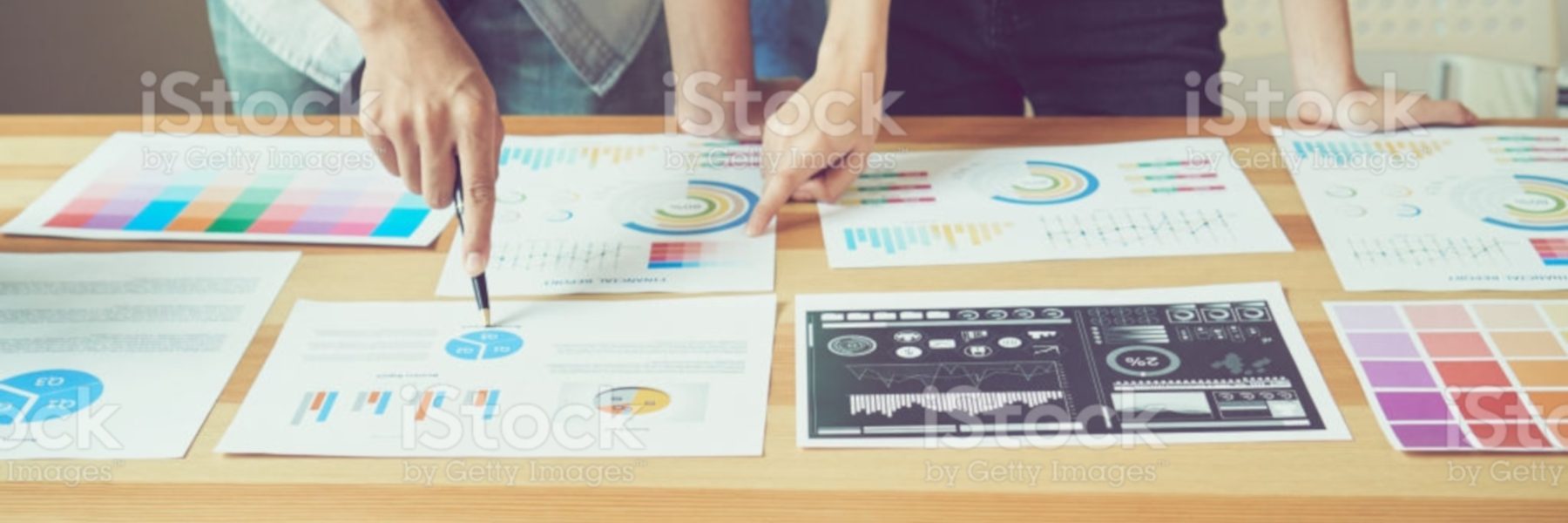I’m Ginevra from Cabbiavoli Estate and I’m #YOURHOSPITALITYPRO
This week on the #YOURPRO series, we speak to Ginevra Puccioni, our #Hospitalitypro. Ginevra is the General Manager of Cabbiavoli Estate, a luxury castle and farmhouse estate located in the Chianti region, one of the most amazing areas in Tuscany, Italy.
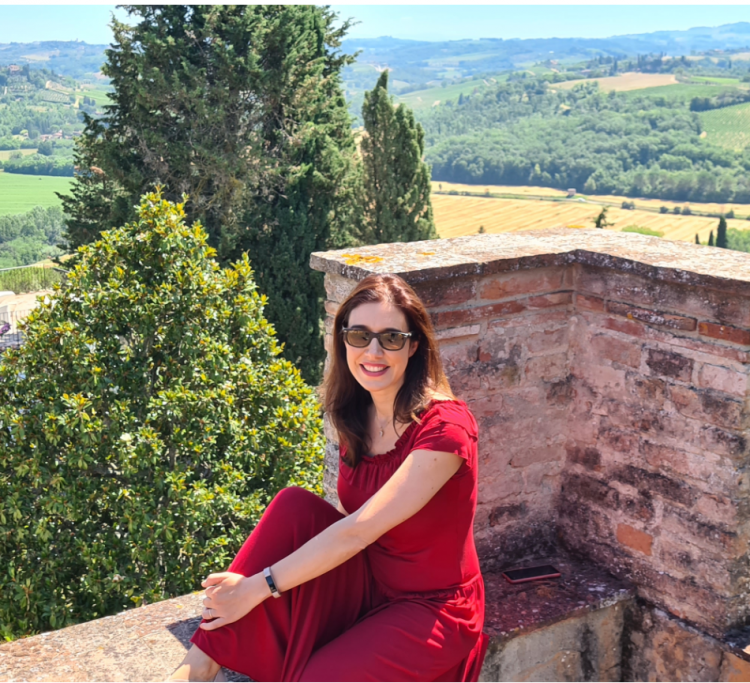
Business description: luxury castle and farmhouse estate in Tuscany, 30 km from Florence
Current job: Cabbiavoli Estate Founder and Manager
One word that best describes how you work: Relentlessly
My greatest success in life: My family and the launch of Cabbiavoli, with Julia Roberts, the actress and producer, as our first client
My biggest fear: Acrophobia (fear of heights)
My secret wish: Walk the whole Camino de Santiago from London to Compostela
My role model is: my godmother, Wanda Ferragamo, a humble and tireless entrepreneur and matriarch
My favourite book: Memoirs of Hadrian – Marguerite Yourcenar
First of all, tell us something about you and your business.
As a child, I can recall that one special day in the shadow of the castle when I had my Grandmother all to myself. I still feel the warmth of the sun, the touch of her hand, and the smell of the cut hay in the fields. My memories are feeling safe, happy, and special. So even after having studied gemology and dedicated over ten years in multiple countries, producing, buying, and selling precious and semi-precious stones, when my father asked me to come home to Cabbiavoli, I felt as if I had to say yes. I loved the idea of creating those same memories for others. This is a property that has been in the family for over 150 years. It still has so many stories to tell, and so many emotions to share yet.
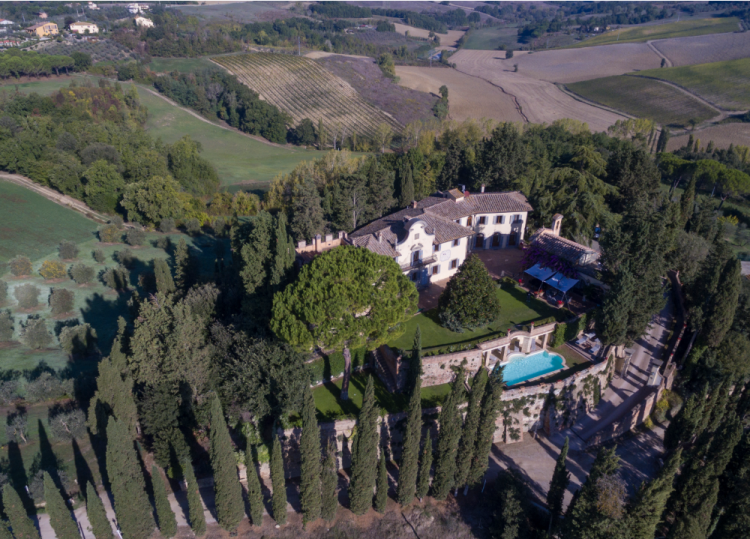
How did you adjust your business in this unusual time?
Creating a “personal experience” with the property is crucial- and that means listening to what our clients are saying – and what they are not saying. It’s easy to establish a relationship when they are here with us, so in this period, we strived to establish stronger personal connections with agencies and strengthen our long-distance (direct) relationships with clients. We listened to their hopes and concerns, which prompted us to look for solutions “outside the box.” For example, rescheduling reservations to 2021 and opening bookings to the local market with extra flexibility on minimum stays and cancellation policies.
How can you engage with your loyal guests and with the new ones?
When clients enter Cabbiavoli, they enter our home and our family, a family with hundreds of years of births, deaths, battles, and arranged marriages; as the Italians would say vita, morte e miracoli (life, death and all the miracles in between). We offer real stories, real info and real photos on social media that share who we are so that our guests are engaging with us before and after their visit to Tuscany.
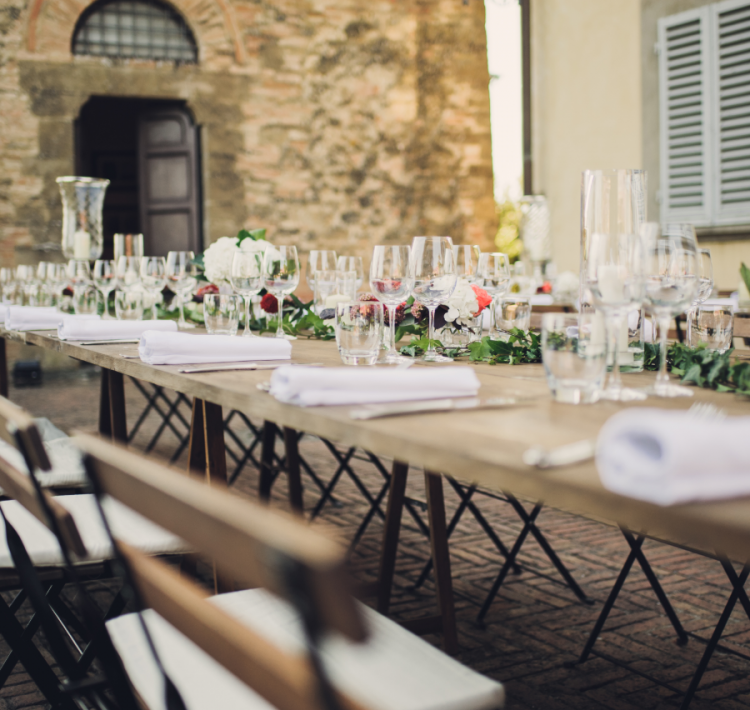
All guests receive a copy of my book on the family history, as a precious gift to further enhance the bond with the property. It took me a long time to compile it as it includes the history of the property since its original foundation in 1210AD. Incidentally, some ‘actors’ are visible in the family portraits or buried in the chapel on the grounds, including the family dogs!
As a hospitality pro, what can you suggest to keep this type of business alive?
Being a small business, I am in touch with every client, and this has been our successful recipe since I started the business in 1997. It has been our experience that relationships and reputation matter now more than individual transactions. In the age of ‘immediate gratification’ and self-service, people want to live genuine and personal experiences. Furthermore, when people go on holiday they want to relax, enjoy themselves, and in many cases, they want to know from local experts what to do. Genuine advice from local people beats any travel agent’s ‘package’.
Tell us your trick to have a good work/free time balance in your day.
When not travelling, I work from home; it is important to have clear boundaries between work and personal life. I am an early-bird; before my family wakes up, I walk around London for an hour and a half; I then get my children ready, walk them to the tube, this is our special moment together. I sit at my desk with my third coffee at 9:00 am sharp and start my workday. When I finish my workday, I dedicate time to the family and only reply to urgent requests.
Tell us how is a typical day of your guests in Cabbiavoli nowadays?
Before customers arrive, I email them a list of activities they can do in the area, including booking services for the main sites to avoid queuing and disappointments.
Customers usually arrive with the expectation to have a packed agenda. Often, after the first day, once they have experienced the local hospitality, including food and wine, they slow down and reduce the ‘activities’ to the morning, with afternoons spent by the pool and walking around the grounds, before the dinner feasts.
Now please fill the gap about your five pro tips:
- Your golden suggestions in this new way of travelling: Travel locally
- How to stay positive: Practice gratitude
- Best place to recharge: Observe your world with an open mind
- A good activity for your health: Early morning walk and an evening glass of wine!
- A game for your brain: to switch off – jigsaw puzzles, to engage – reading a book
Follow @cabbiavoli_castle
The WeGiveIt #YOURPRO it’s published regularly at WeGiveIt Blog. WeGiveDigitalServices is a London-based Digital Agency, specialized in helping businesses to optimize their Cause Marketing and their Brand Strategy.
Contact @sara
I’m Rusi from Rusi Designs and I’m a #WORLDCHANGER
This week on the #WORLDCHANGERS series, we speak to Rusi, founder and designer of Rusi Designs.
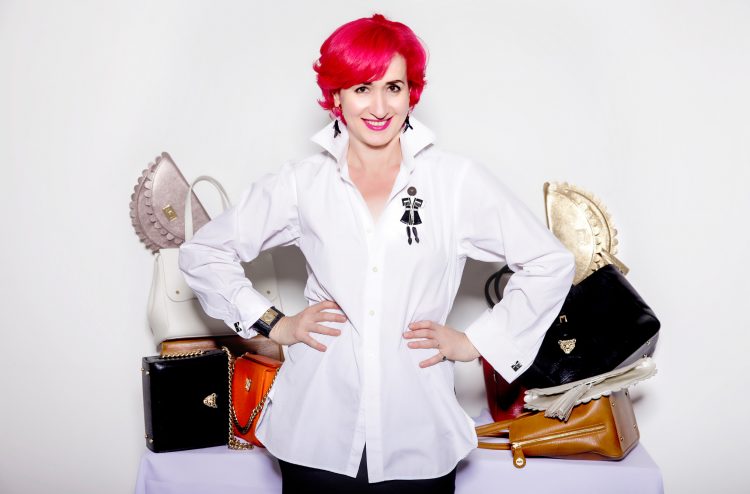
Location: London
Current job: Founder and Creative Director Rusi Designs,
My greatest success: Seeing the President of Georgia wearing my handbag when she met the President of France and his wife Bridget.
My role model: Gabriella Hearst
My biggest fear: People continue consuming throwaway fashion, which will eventually lead to more environmental disasters.
My life dream: create a luxury lifestyle brand – Rusi Designs
My favourite website: www.net a porter.com
First of all, tell us a little about your background and how you got to where you are today.
I was born in Tbilisi, Georgia. Despite studying environmental chemistry at university, I had always wanted to be in fashion, but fashion schools did not really exist in Georgia where, at that time, fashion was not considered to be a profession. Georgians are very much like Italians, they love fashion and looking good is And was very important to them! I made my own clothes, before that my mother made clothes (she was a mathematician but loved to sew!) and my grandmother also made clothes – she was a professional seamstress. Maybe my love of fashion comes from my grandmother? She was a very important person in my life and I am named after her. She told me ever since I was a little girl, I was always gathering fabrics into a sort of pouch and saying it was a bag!
When I moved to Brussels I enrolled in the Art Academy there and then obtained an Interior Design degree with the Rhodec International UK, but it was not until I joined a five-day handbag making course in London, that I realised how much I loved handbags! I created my first clutch bag in Bangkok in 2013. I found this little workshop and I asked the craftsman, Tony, to make me a sample. I sat with him to share everything I knew from my course. RusiDesigns was born! I never set out to make cheap bags, I wanted quality and longevity in my products. My first clients from my Asian production days are still with me. I offer a lifetime guarantee to make things right if something goes wrong – it seldom does, but for me, the customer’s experience is very important, so I go the extra mile. I moved my production to Italy after 3 years of testing the ground. My current factory makes bags for Chanel and Delvaux. It does not get better than this. I am so proud.
How does inspiration come about for your creations?
I start thinking about the new design with someone in mind. I think about their lifestyle and what they do on a day-to-day basis, then I play scenarios in my head and come up with ideas and solutions. Sometimes it’s instant. Sometimes it takes time. But the most important thing is to create something that people will treasure. I believe in longevity and simplicity. I think the essence of design is simplicity, and simplicity is in good design!
Today we talk more about sustainability, in what Rusi Designs can be defined sustainable?
To me, sustainability is quality over quantity. If something is well crafted it will last longer. If you do not need to replace it after a short time it’s better for the environment! I make small numbers and I do not waste any leathers. I use every piece of leftover leather to create something useful. I work with responsible factories where the artisans get paid a fair salary, and I work with local models and photographers so they do not need to travel far thus reducing my carbon footprint. On a personal level, I reuse and recycle everything I can, and I walk and use public transport wherever possible. I support the economy in these difficult times by giving people jobs.
Can luxury and sustainability coexist?
Absolutely. Luxury to me means quality and taking responsibility for your actions in environmental terms. Be responsible, waste less, give back, make quality items that last.
Tell us about a moment when you knew that it was all worth the hard work
Seeing my Mezzaluna tote being worn by the President of Georgia while on an official visit meeting the President of France and his wife. The Georgian President sent me a photo saying “Two Presidents and one bag”. Oh, joy!
What about your cause marketing? Has your company been involved with a cause or charity partner?
Due to my husband’s work as a career diplomat, we lived in Asia for 8 years. While there I worked closely with women’s organisations on charity projects. One of the last projects was a charity fashion show at the British Ambassadors residence in Bangkok, Thailand, with the amazing charity Steps with Theera – they promote equality and independence, by giving employment to adults of all abilities. It was a very fulfilling experience.
What is Rusi Designs vision for the next 5 years?
I just want to be able to continue to do what I do best, and grow my brand into a lifestyle brand.
How do you recharge? What do you do when you want to forget about work?
Now that made me smile! I love what I do and I never want to rest from it! As someone famously said: do what you love and you never have to work a day in your life.
What book are you currently reading?
I listen to podcasts, and my current book is an audiobook on learning Italian. It is never too late to learn.
What would you have done differently if you knew then what you know now?
I probably would have started earlier with designing handbags – but better late than never. I believe everything happens for a reason.
Fill in the blank: I’d love to see _____ answer these same questions.
Gabriella Hearst
You can follow Rusi Design at @rusidesigns
The WeGiveIt #WORLDCHANGERS series asks heroes, experts, and leaders to share their ambitions, routines and more. We love to interview brands with purpose and listen about their work and their way of giving back. We can help you to optimize your Cause Marketing and your Brand Strategy to reach your profitable and ethical goals
WGDS is a Digital Agency based in London specialized in optimizing the digital presence of brands and charities.
I’m Laura Winningham from City Harvest and this is #MYCHARITY
This week on the #MYCHARITY series, we speak to Laura Winningham, CEO of City Harvest a charity organisation that puts surplus food to good use in a sustainable way.
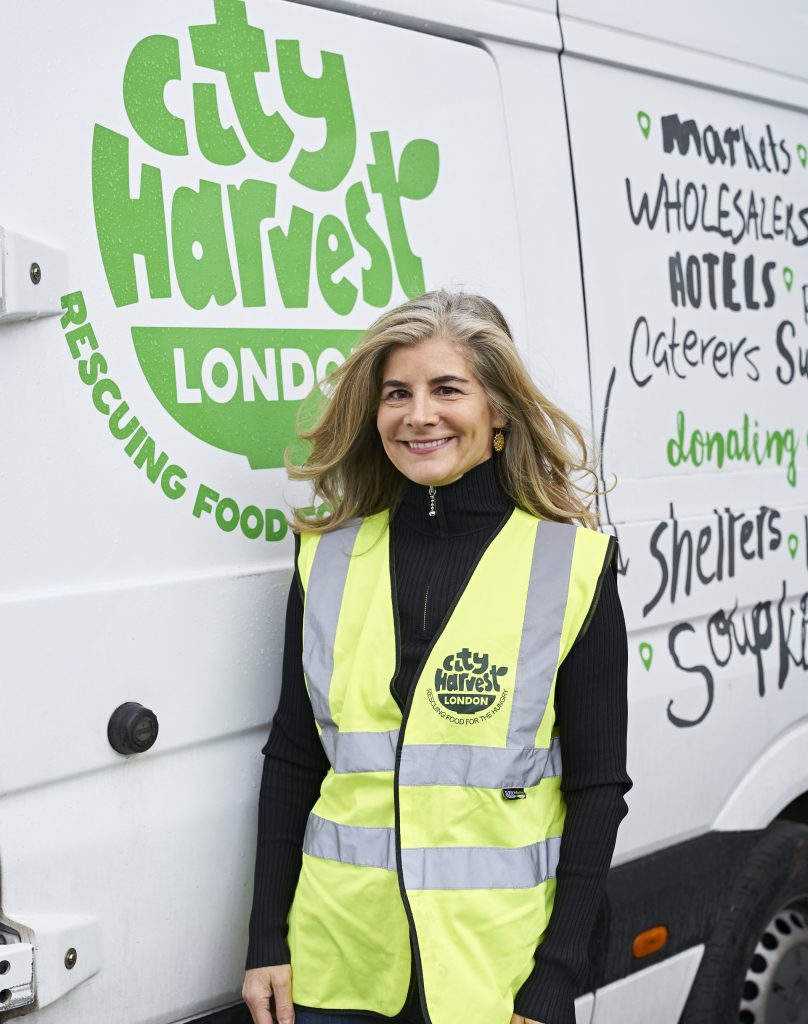
Location: London
Current job: CEO, City Harvest
One word that best describes how you work: Meticulous
Your biggest success: 10 million meals delivered in London, 15,000 tons of greenhouse gases prevented by redistributing surplus food to those in need.
Your greatest fear: Earthquakes—I’ve been in a few.
Your biggest dream: My children thrive and achieve all they set out to do
Your favourite movie: Fargo
First of all, tell us a little about your background and how you got to where you are today.
I’m originally from New York, where I worked in the world of finance, investing in media and telecom stocks at a private investment partnership. I have an MBA from Stanford with a focus on entrepreneurship and had a taste for investing with a purpose, having spent time as an analyst at a socially responsible venture capital fund whilst I was a student. After taking time out of the corporate world to raise twins I decided to move in a different direction. I was aware that in New York and other major cities around the world, there were organisations rescuing fresh surplus food from local businesses that would otherwise go to waste and delivering it to people who needed it most. I believed that there was a large need in London for this type of organisation. We estimate that each month in London food for 13.3 million meals is wasted whilst at the same time 9.2 million meals are missed by people living in food poverty.
Some friends were collecting food from Whole Foods Kensington to help a local church in West London and we decided to test the market, connecting more food businesses and additional charities. We launched City Harvest with an old borrowed refrigerated van and a few early food partners in addition to Whole Foods such as Morrisons, M&S and Charlie Bigham’s. The rest is history. We now redistribute more than 100,000 nourishing meals each week to 300 charities in every London borough.
Take us through a recent workday at City Harvest
City Harvest have doubled in size almost overnight to meet the spiralling levels of hunger that are resulting from the Coronavirus crisis. We’ve delivered almost 1 million meals in the first 6 weeks of the lockdown. We’ve done this with many of our usual team self-isolating and a skeletal team in the office, operating with social distancing. So a recent workday has left very little time for sleep. Our partners, many of whom served community meals to large groups of people have changed format and City Harvest has had to adapt to meet their new need to provide food that is best suited for food parcels and home deliveries. At the same time, the food supply chain is in disarray and we’re adapting to changes on that side of our organisation as well. With a need for more food, we need to educate more food businesses about the importance of donating any surplus food. We’ve needed to train new drivers and get temporary additional warehouse space to stock the growing inventory.
The entire City Harvest team has been extraordinary and heroic. I’m so proud of what they’ve achieved. As one of the founding members of the London Food Alliance, we are working with the Mayor’s office and local boroughs to ensure that all individuals have access to the food that they need during this emergency.
How do you discover new ways to innovate in your working day?
At City Harvest, we’re always reflecting and evaluating the work we do with the ultimate goal of delivering more nourishing meals to more people. We are very data-driven and use our real-time information to evaluate the efficiency of our fleet of food rescue vans, the nutritional content of the food we rescue, and many other metrics to ensure we are efficiently using donor funds to better nourish the community. We have an Impact team that is focused on more qualitative issues. They are speaking with our charity partners, getting a feel for the need in the community and clarity on whether City Harvest is effectively meeting the need of the thousands of men, women and children who have issues accessing food. We always seek feedback from our partners and are eager to hear the stories of the people that are nourished with food from City Harvest. We’re always analysing results so we can improve our outcomes.
What is the next big thing in the charity sector?
The immediate focus for most charities will be to find the support needed to survive in a very challenging social and economic climate resulting from the COVID Crisis. One key will be collaboration- during this crisis, more than ever, I’ve witnessed charities sharing information, ideas, and technology. The ability to rapidly form partnerships has been important in what is essentially a humanitarian food aid crisis in our own backyard. There’s a sense that we’ve gone from nourishing our neighbours to working in life and death situations. Volunteers delivering meals are often the ones to call ambulances to help vulnerable, self -isolating people who have been neglected and malnourished.
How do you choose business partners to support the charity?
Our sustainability goals are aligned with many of the corporate partners with which we work. Our food redistribution work, nourishing people with food that would otherwise go to waste, meets 9 of the UN Sustainable Development Goals such as No Poverty, Zero Hunger and Sustainable Cities.
Many companies want to make a very hyperlocal impact, directly in and around the locations where their employees live and work. City Harvest operates in all London boroughs and we can give each corporate partner a very clear impact report on how we help vulnerable people in their areas. Some companies wish to benefit a specific group such as children, refugees, families, women facing domestic violence, the homeless. City Harvest delivers food to programs that serve almost every vulnerable group.
Companies can send volunteers to help us sort food and deliver to different projects and see the direct impact that they are making. This is a very inspiring experience. We have fantastic partnerships with food businesses, which are at the very foundation of what we do and with others who offer financial support and volunteering to keep our vans on the road delivering food. Companies such as William Blair, Artemis Funds, T Rowe Price and foundations such as Citybridge Trust, Portman Foundation, and the Worshipful Company of Fishmongers and the Grocers have been invaluable to our work. We also benefit from skills-based volunteering, having individuals who are some of the best and brightest in their fields offering us professional services. All of these partners share our interest and passion-getting great quality, nutritious food to London’s most vulnerable.
Tell us about your favourite case history of the most successful partnership.
It’s so hard to choose – City Harvest has more than 300 community partners who receive our free food surplus food deliveries each week. These community meal programs, children’s’ programs, family centres, and elderly drop-in sessions are each doing heroic things that transform lives for the better. Food is a tool they all use to embrace people, bring them in, offer them friendship and other services. We have several partners who we work with on multiple programs like the Mayor’s Fund Kitchen Social, which ensures children have activities and nourishment during holiday periods—times when unfortunately many children in London face adversity. Foodcycle has many hubs around London, and City Harvest delivers food to several of these. I have a special place in my heart for Choir with no Name which brings vulnerable, homeless people together for a weekly choir rehearsal and during the holidays does wonderful performances throughout London. City Harvest delivers the ingredients that enable more than 80 people to have a wonderful vegetarian meal weekly after theses rehearsals.
Our partnerships with restaurants, supermarkets, manufacturers, events companies and others make what we do possible. We look forward to annual events in London which choose to give us really special surplus food donations—Wimbledon, RHS Chelsea Flower Show, and the International Food & Drink Event. And we value our partnerships with New Covent Garden market and New Spitalfields Market since we focus on fresh nutritious food—35% of the food we deliver is fresh fruit and vegetables. Supermarkets like Whole Foods and Morrisons have been great supporters and manufacturers of nutritious meals like Charlie Bigham’s have been so important to nourish the community.
How do you recharge? What do you do when you want to forget about work?
Leading a food redistribution charity during an emergency food aid crisis leaves little time to switch off. It definitely involves lots of sacrifice on the part of our entire team! I’m sure this is true across all charities. What drives this hard work is a sense of pride in what we all accomplish each day. I read several books each week and because gyms are currently shuttered due to coronavirus risks, I am benefiting from fantastic streaming Pilates classes from my favourite studio (heartcore.co.uk) which I squeeze into my schedule. I have zoom calls with old friends based all over the world and most importantly, find time to laugh—having identified several streaming shows to watch with my husband and twins that offer a complete distraction from the challenging issues in the world today.
What are you currently reading, or what’s something you’d recommend?
I usually read an eclectic combination of books at any one time, a mix of fiction and non-fiction, and have a monthly book group (now on zoom!). I’ve recently read The Feather Thief, The Salt Path, The Dutch House and I’m about to start The Mirror & the Light,
Fill in the blank: I’d love to see _____ answer these same questions.
I’ve met so many inspiring people in this sector recently, of whom I’d love to ask all these questions! Since City Harvest delivers food to more than 300 community organisations, I’m continually impressed by the individuals I see working so hard to make such a great impact. Louisa Mitchell, West London Zone, Louise Holstein, Mike’s Table, Mary McGrath, Foodcycle, Dee Woods at Granville Community Centre and Dan Atkins, Buses4 Homeless are just a few of the people who I find very impressive. We also collect food from hundreds of companies and I meet so many people who are doing impressive things and supporting City Harvest in the process. Emilie Vanpoperinghe, founder of Oddbox and Ali Warburton founder of POW foods are two who come to mind.
What’s the best advice you’ve ever received?
I’m a keen believer in paying it forward. City Harvest has been successful because of the tremendous support of so many different partners and stakeholders and we try and take a very collaborative approach, passing on the goodwill we’ve been so fortunate to receive to others. Over the years, we’ve been given a tremendous amount of advice from the CEO, Lori Nikkel, of Second Harvest in Toronto. She responds to every query with incredible speed and with thoughtful responses. So we are thrilled when people ask City Harvest for guidance on how to start a food rescue organisation and we can pay it forward. We often get calls from other cities and countries and we’re thrilled to share our knowledge and learnings.
You can follow City Harvest on Instagram @cityharvestlondon
The WeGiveIt #MYCHARITY series asks heroes, experts, and leaders to share their ambitions, routines and more and it’s published on WeGiveI Blog.
We love to interview charity’s leaders and listen about their work and their way to create great partnerships. If you want to learn more if the Purpose-Cause match is effective and well-communicated check out how we can help.
WGDS is a Digital Agency based in London offering Digital Brand Strategy, Google data analysis, Marketing Strategy and Cause Marketing Plans.
We are specialized in optimizing the digital presence of brands with purpose and charities.
I’m Elizabeth Rees from ElizaEliza and I’m a #WORLDCHANGER
This week on the #WORLDCHANGERS series, we speak to Elizabeth Rees founder and designer of ElizaEliza that creates the perfect zip purse to #carryyourcause.
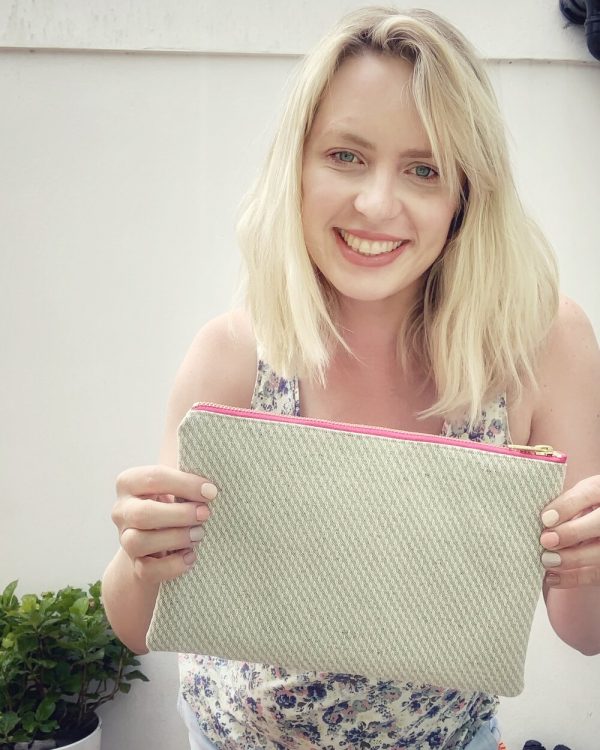
Location: Cardiff, Wales
Current job: Full-time Mum, Founder of Eliza Eliza
One word that best describes how you work: Analytically
Current mobile device: iPhone XS Max
Favourite website: BBC News
First of all, tell us a little about your background and how you got to where you are today.
Before becoming a mother, I taught as a Secondary Geography Teacher and never really went back. Taking a step back to have children, made me realise that teaching wasn’t something I felt truly passionate about. Whilst I was on maternity leave, I rediscovered my love of sewing. I made a zipped pouch to organise my changing bag better and my family and friends started asking me to make these pouches for them too. Before long I was selling via Etsy and not long after, set up my website. I’ve been fortunate enough to have had so much support along the way, featured by magazines such as Stylist and In the Moment magazines as well as being shared by influencers such as Gillian Anderson. All this has helped me get to spread my message and mission of building awareness all over the world, for the causes we care for.
How can you define Eliza Eliza ethical/sustainable?
In my mind, every business should without question be ethical/sustainable. Unfortunately so many are not. The choices of who makes the materials and products we use and what they are made of should not, in my opinion, be at the detriment of someone else’s health, wellbeing or wealth. I have worked hard over the years since starting Eliza Eliza to educate, research and carefully source the materials I use. Getting to know my suppliers and not being afraid to ask questions. For example, I spent quite a bit of time, particularly early on in my business, speaking to the hemp producers I use. They are undoubtedly passionate about what they do and taught me so much about hemp’s eco-friendly advantages compared with other textile choices. Environmentally friendly and non-exploitative textile production is central to their business model, these are the businesses I want to work with now and in the future.
What motivates you?
My children motivate me. I want them to grow up understanding the importance of kindness, looking after each other and that giving back can be just as rewarding as receiving. I hope that my business shows them in just a little way how this can be done.
Tell us about a moment when you knew that it was all worth the hard work.
The first time I sent a donation to my charity was the best feeling. It wasn’t even a huge amount, but the fact that I could contribute from something I had I made and someone else had chosen to purchase was incredibly rewarding.
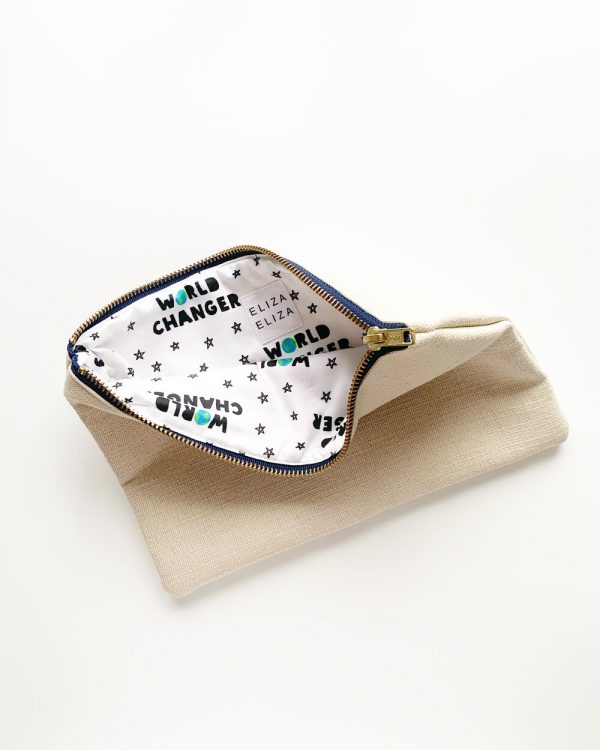
How does Eliza Eliza get involved with a cause or charity partner?
Sometimes it’s the cause that comes first and I research to find relevant charities to support it and other times it’s the charity that I initially discovered. But they have to work together appropriately. In some instances, I launch without a charity because it can be just as important to raise awareness around the cause as raising money. When I contact the charity, I explain what I do and we agree on a partnership agreement.
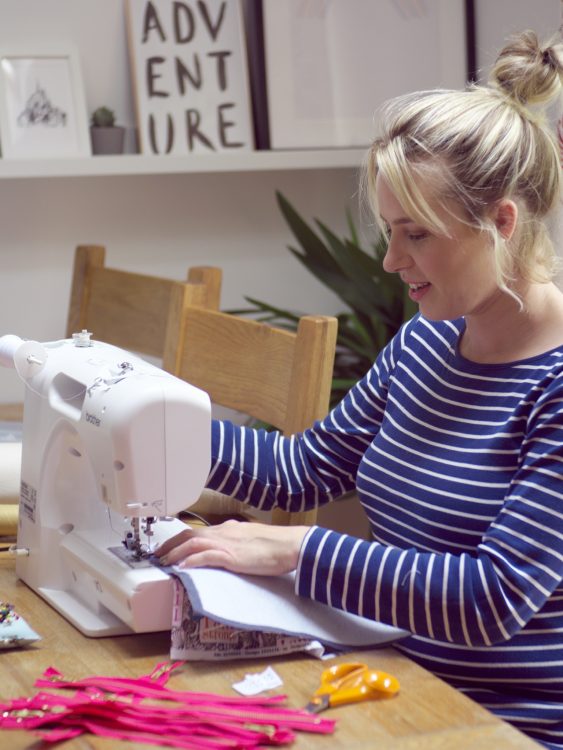
How do you recharge? What do you do when you want to forget about work?
Yoga, meditating, going for a run or walk always help me recharge. I do so much of my work through my phone, that switching it off every once in a while help give me a break and allow me to focus attention elsewhere.
What book are you currently reading?
Borrow Box allows you to digitally borrow e-books and e-audiobooks from your local library. I’ve been listening to The Happiness Advantage by Shawn Achor which discusses how happiness and positivity can contribute to successful futures. I’d definitely recommend it.
What would you have done differently if you knew then what you know now?
Without sounding too cliché it really is the journey that counts. I love to think that I could have forgone the stresses of training and being a teacher, but there are so many lessons and skills I learnt from that time.
Fill in the blank: I’d love to see _____ answer these same questions.
Kate Auguste from Mi Apparel
You can follow Eliza Eliza at @elizaelizauk
The WeGiveIt #WORLDCHANGERS series asks heroes, experts, and leaders to share their ambitions, routines and more.
We love to interview brands with purpose and listen about their work and their way of giving back. We can help businesses to optimize their Cause Marketing and their Brand Strategy.
I’m Susana Prudêncio from Calouste Gulbenkian Foundation and this is #MYCHARITY
This week on the #MYCHARITY series, we speak to Susana Prudêncio, from Calouste Gulbenkian Foundation.
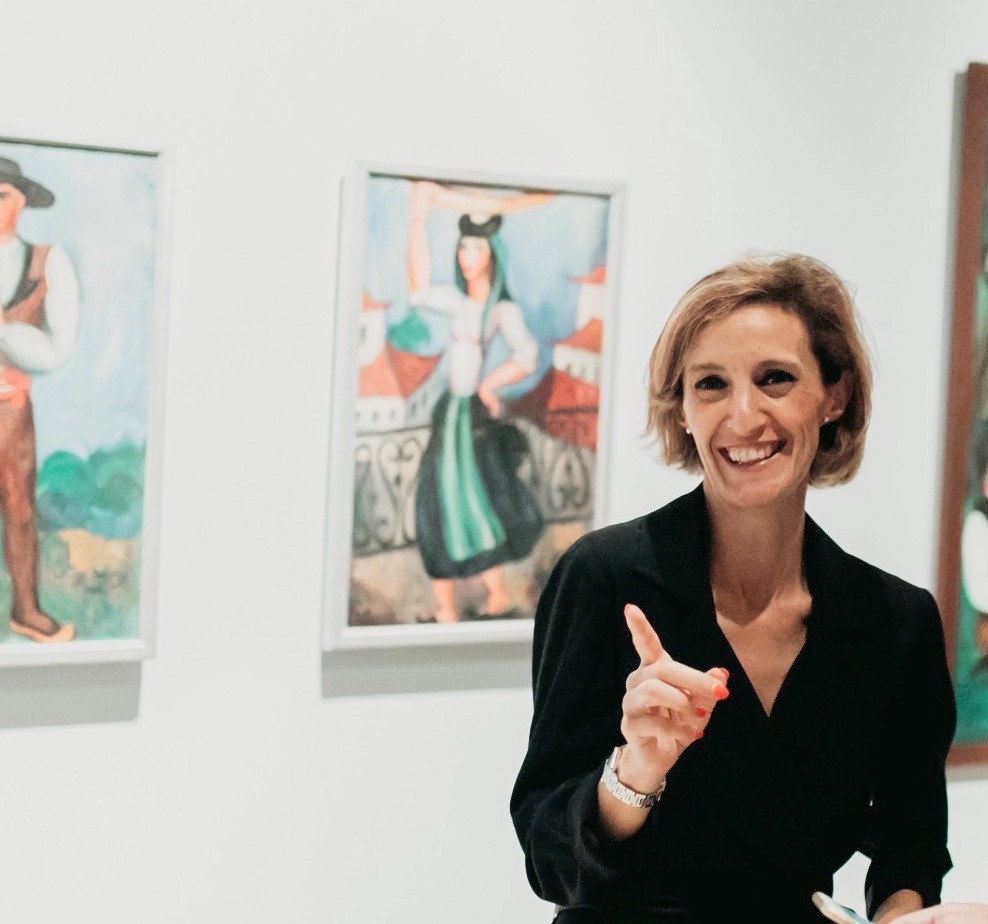
Location: Lisbon
Current job: Deputy Director of Marketing and Digital Transformation at the Calouste Gulbenkian Foundation
One word that best describes how you work: Positivity, I always believe it is possible
My greatest success: two innovative projects that I helped to create more than 20 years ago, that are still in use today, and I am very proud of: the creation of a concept for the stores of the National Museums in Portugal and the Project «Um Mecenas um Museu» (A patron a museum).
My biggest fear: An empty house
My secret wish: Take the Orient Express or live in Amalfi for a season
My role model: My mother. A wonderful human being.
My favourite website: Barbican
First of all, tell us a little about your background and how you got to where you are today.
My career started at the National Gallery in Washington where I had the chance to learn from the best and to see how a big museum is managed. Then I moved back to Portugal and I worked at several cultural institutions such as the National Museums Institute, the Serralves Foundation in Oporto and the Calouste Gulbenkian Foundation, where I’ve been working for 13 years. My work experience has always been very dynamic and encompasses different areas such as corporate partnerships, brand/design and communication activities or the creation of unique experiences in the world of arts for regular visitors and business customers.
Can you explain what is Calouste Gulbenkian Foundation?
The Calouste Gulbenkian Foundation is a wonderful cultural and philanthropic institution. Its founder, Calouste Gulbenkian, was a very wealthy businessman and art collector, whose concern about the fate of his art collection during World War II motivated his desire to move to the United States. Fortunately, he stopped in Lisbon on his way and changed his mind. He spent the last years of his life in Portugal and decided to create, by will, a foundation to which he would bequeath his fortune and art collection.
The Foundation aims to improve people’s lives through art, education, science and charity. In addition to the headquarters in Lisbon, it also has delegations in London and Paris, places where Gulbenkian lived.
What does it mean for you Digital Transformation?
I see Digital Transformation as our full adaptation to the technology-based world where we are living today. From storage to equipment, from productivity tools to digital campaigns, the digital transformation affects both internal processes, namely the working environment, but also external processes, such as communicating to our audiences.
In which way is Calouste Gulbenkian Foundation is embracing the digital revolution?
The high level of digital preparation of our organization has radically changed in the last years and has been proved to be especially important during this pandemic. It has allowed us to keep our daily work in the safety of our houses, without significant disruption.
We have developed a strategy related with the development of platforms and digital contents that allowed us to keep connected with our audiences by providing relevant and up to date content; live-stream concerts, conferences, guided tours, conversations with curators at home, challenges on social networks, among many other actions. Art is useful and it is revealing its importance in people’s lives right now. Have you noticed the number of people sharing works of art and experiences with works of art lately?
How do you discover new ways to innovate in your working day?
I try to be up to date by following the work of cultural institutions of reference, I am “connected” and attentive to new trends. In our team, we have very young people that keep challenging me.
Can you tell us a key lesson you have learned along the way
Observe, listen to others, listen to the heart and common sense.
How do you recharge? What do you do when you want to forget about work?
I am a big fan of walking, I love to sunbath and swim in the ocean.
What would you have done differently if you knew then what you know now?
I don’t have time for regrets ?. I am always focused on the present moment and future achievements.
Finally, as Calouste Gulbenkian Foundation has an incredible art collection, which one is a breathtaking piece that people can’t miss?
It is extremely hard to highlight one piece of art in such an extensive collection, which goes from ancient Egypt to the 20th century. I like many of the artistic periods covered and its major artists like Rembrandt, or Turner. Nevertheless, if I had to choose, I would probably follow my emotions and pick the Francesco Guardi room. I already liked this room before working at the Foundation. For me, it is a magical place, with a considerable number of paintings illustrating the 18thcentury Venice. The paintings portray the beauty of the city, from the Grand Canal to Giudecca. The most glamorous it is the one that depicts the Feast of the Ascension in St Mark’s Square.

The light, the ambience, the movement, the dresses, everything entice us and take us to that place. I close my eyes and I am momentarily transported to the arcade of the Florian café, having some wine and laughing with loved ones. This room makes me happy! Isn’t that the good thing that art gives us?
You can follow the Calouste Gulbenkian Foundation on Instagram at fcgulbenkian
The WeGiveIt #MYCHARITY series asks heroes, experts, and leaders to share their ambitions, routines and more and it’s published on WeGiveI Blog.
I’m Robbie from RF Bespoke Fitness and I’m #YOURFITNESSPRO
We are starting a new WeGiveIt series, #YOURPRO, asking experts and leaders of different industries to share how they are adapting to the sudden change of lifestyle and what is it their new normal. The first expert of this series is Robbie Fotheringham founder of RF Bespoke Fitness for Children and Adults.
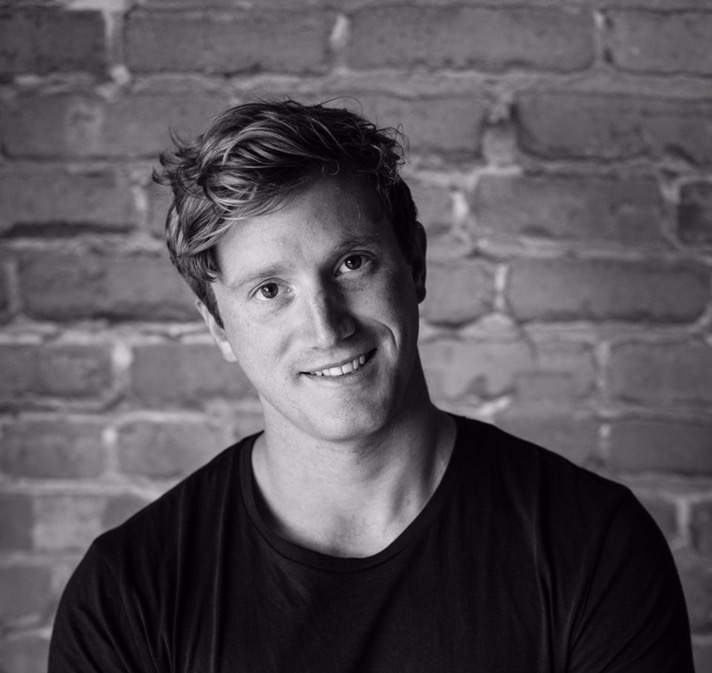
Location: London and anywhere you are
Current job: RF Bespoke Fitness Founder
My favourite website is… Sadly BBC News in this current time.
My favourite Netflix/Amazon Series is…Netflix: The last dance Amazon: All or Nothing.
My favourite book is…What They Don’t Teach You at Harvard Business School, by Mark McCormack. Quiet, by Susan Cain
My role model is…Sports icon growing up Jonny Wilkinson. Current: My parents
My favourite food is: Italian
My life dream: Happiness/contentment and to live by the sea.
First of all, tell us something about you and your business
I run a bespoke fitness business – RF Bespoke Fitness – carefully designed to develop physical and mental wellbeing for adults and children. Services include Personal Training, Sports Specific Coaching and Mentoring. Our RF Trainers come to you whether you’re at home or abroad as part of a package. Through my years of playing professional sport, personal training and illustrating children’s books I’ve managed to build a rather niche business for myself. I’m able to combine the physical aspect of training with creativity and imagination. This recipe has allowed me to bring out the very best in my clients, young and not so young. I have the great good fortune of a career that I love.
How have you adjusted your working day for this special situation?
We are in a unique situation with a lot of uncertainty during this time. Some are more fortunate than others. For me, I have had to adapt fairly quickly to the online world, as a good deal of my work is face to face. I’ve been lucky enough to have a successful client base through word of mouth, but as a secret introvert, having to film myself online and create content on social media has taken me way out of my comfort zone. However, in being this lockdown has been a blessing in disguise for me. I’ve been able to push aside my fears and develop video workouts and challenges each week to keep my clients engaged, and motivated. I’ve found that short and sharp video clips along with a 20-30 minute live online sessions is the way forward. I don’t know why I haven’t done this before!
Tell us your trick to have a good work/free time balance in your day.
I believe structure is key. Things that I feel are important to factor into your day are the following: Exercise, of course, this can vary from 10 minutes of stretching and moving to a HIT session, or going for a gentle jog. This will keep you energised and motivated and above else distracted from any worries. Reading and arts and crafts. A superb way to unwind and again take your mind elsewhere. Socialising and communication. This will keep you sane. I try to call one friend a day who might be by themselves or in a worse position than me, and this is where gratitude falls into place. Live in the present rather than worrying about the past or future. All easier said than done I know, but if you can factor those into your day, it will have a big impact on your mental health and productivity levels.
How can you engage with your clients and keep them loyal while working from home?
I’ve always had a great relationship with my clients, and quite often I would have to travel for work being away for a few weeks at a time. I always make sure they have a programme to follow whilst away. I try to keep in touch as much as possible whether that might be a quick call or text message to check in with them and see how they are progressing. I think this approach has worked pretty well so far. The lockdown situation is not too dissimilar, in fact it’s spurred me to develop new ways of communication such as Zoom and video calls.
Do you have any favourite digital platform to do online sessions?
I use iMovie from my phone to develop and edit videos. Zoom and WhatsApp video call for live sessions. These have all been consistent and useful for me.
How important is your social life for your mental wellbeing?
Hugely important. If you’re like me and run your own business it can be a lonely world. You have to be proactive in making time for your friends and loved ones. It has a large impact on your confidence and mental state. I like to keep my head down during the week and make time on the weekends to enjoy a social life. I do believe we all need human contact and having a relationship over the phone is not quite the same. I enjoy moments of solitude, whereas some of my friends require constant attention! But getting the balance right is key.
Now please fill the gap about 5 golden tips to maintain your healthy lifestyle:
- Best sport/activity to practice at home: Any exercise that does not involve equipment. This can be yoga or bodyweight exercises to lift your mental state and energy. I sometimes enjoy a quick HIT session for 15 minutes in-between work to keep me energised.
- A good diet: suggests 3 key things shouldn’t be missing: Foods rich in Vitamin D. I grew up in Scotland, so naturally deficient in this area. Try to fill your plate up with a rainbow coloured variation of foods. This means you are more likely to be getting a sufficient amount of nutrients in your diet daily. I think protein whether it’s from plant-based food or meat, we all need this to help our body’s recovery from exercise, to feel more energy and to boost your immune system
- How to keep your friends close: I believe it is important to call your friends in these uncertain times. I know they might not admit it, but they will appreciate it so much more than a WhatsApp message or over a group chat.
- How to get your ‘me time’ with partner/family always around? I moved back home to Scotland just before the lockdown. We are very fortunate enough to have plenty of space to escape the madness. I tend to take myself away for a walk or run.
- A game for your brain: I love Scrabble and Boggle. It’s fun and competitive. I also love to play catching games with various tennis/footballs, almost like juggling. It’s a great way to warm up the brain and improve hand-eye coordination at the same time. Ideally, you need someone to play with!
Follow @Robbie Fotheringham Bespoke Fitness
We can help you to optimize your Cause Marketing, enhance your Brand Presence and give you targetted education with our Marketing Workshops.
I’m Mark Curtin from The Felix Project and this is #MYCHARITY
This week on the #MYCHARITY series, we speak to Mark Curtin, CEO at The Felix Project, a charity that prevents food waste and works to eradicate food poverty and hunger.
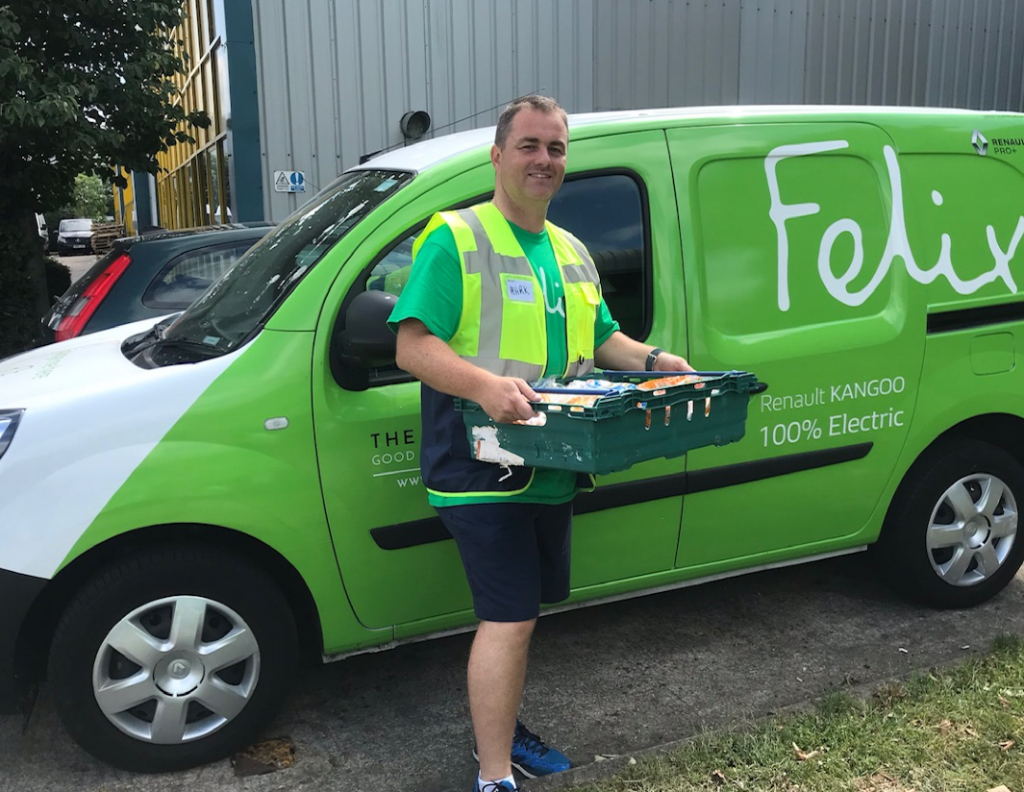
Location: London
Current job: CEO at The Felix Project.
One word that best describes how you work: Teamwork
Your biggest success: Personally – My children.
Your biggest success: Professionally – leading my team during COVID19 crisis.
Your greatest fear: Forgetting to recognise everyone’s efforts.
Your biggest dream: My children achieve everything they want to.
Your favourite movie: Star Wars IV, A new hope.
First of all, tell us a little about your background and how you got to where you are today.
I come from a fairly working-class family from North London and later Milton Keynes. Then, I started in professional sport, playing football, then coaching, which took me overseas to the U.S. for a while. Later, I worked in Further Education and then Sport for Development for over 10 years, before several senior management roles in various Education and Children’s charities. In July 2019 I became CEO at The Felix Project, a charity that prevents food waste and works to eradicate food poverty and hunger in London.
Take us through a recent workday.
Since the outbreak of COVID19, I am working very closely with all teams, ensuring we are responding and adapting to the fast-paced environment that we operate within. I deal with the media and a huge range of very grateful donors and supporters who are working to help us. My main priority to work closely with my teams, many of who are now working remotely to discuss work, assess situations, analyse the impact on our work and make decisions with the team to have maximum impact. I also prioritise saying well done and thank you and making sure everyone is safe and healthy. I tweet, post and communicate via social channels a great deal and generally find every day is quite different at the moment.
How do you discover new ways to innovate in your working day?
I ask the very talented and clever people I am surrounded by, I listen, I observe and I learn… then I apply what I think works best for what we are trying to achieve.
What is the next big thing in the charity sector?
Embracing the learning and requirements to adapt and change during the COVID19 crisis, the best charities will thrive if they can innovate, adapt to whatever becomes the new world we operate within and remove any out of date practices and approaches
How do you choose business partners to support the charity?
One simple question – Will they enable us to achieve our mission?
Tell us about your favourite case history of the most successful partnership.
Not sure we have a favourite one as many businesses work very well for us in different ways. But those partners who engage with us in multiple ways, helping us to tell our story, developing and improving our organisation, bringing their people to work with us through volunteering or other opportunities and helping us to achieve our mission and reach our goals are always the best!
How do you recharge? What do you do when you want to forget about work?
Spend time with my wife and children. I also like to run or get out on my bike. I am known to frequent the Emirates stadium very regularly too to watch my beloved Arsenal!
What are you currently reading, or what’s something you’d recommend?
I haven’t had the time to read a book recently, but my all-time favourites are Black Box thinking by Mathew Syed, Creativity Inc by Ed Catmull or for a bit of light relief and something from my childhood William Golding’s brilliant Lord of the Flies. I would also say watch any Sir Ken Robinson TedTalk!
Fill in the blank: I’d love to see _____ answer these same questions.
Neil Purcell, CEO at Talent Works International or Mike de Giorgio Founder of Greenhouse Sports.
What’s the best advice you’ve ever received?
Make sure you are never the smartest person in the room, surround yourself with the best talent and always listen more than you speak when in a leadership role.
You can follow The Felix Project on Instagram @thefelixprojext
The WeGiveIt #MYCHARITY series asks heroes, experts, and leaders to share their ambitions, routines.
We can help businesses and charities to optimize their Cause Marketing, enhance their Brand Presence and give targetted education with our Marketing Workshops.
I’m Angelo from Angelo Galasso and I’m a #WORLDCHANGER
This week on the #WORLDCHANGERS series, we speak to Angelo Galasso, founder and designer of Angelo Galasso, an elegant and inventive luxury menswear brand.
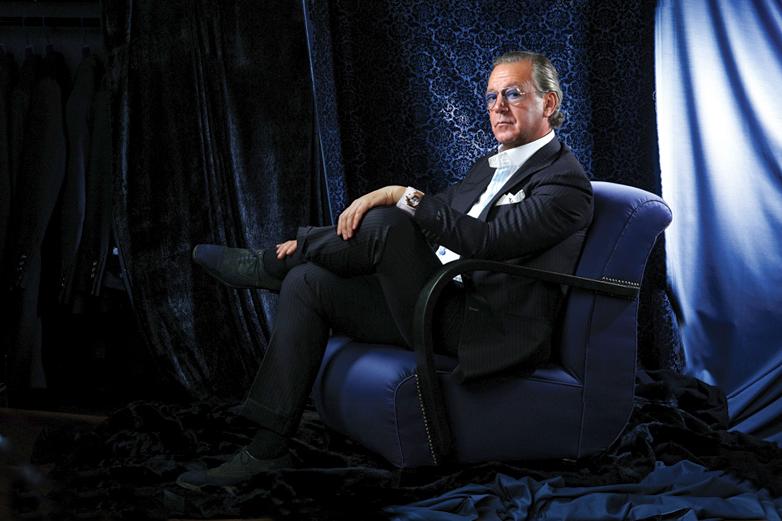
Location: London
Current job: Founder & Creative Director of Angelo Galasso
One word that best describes how you work: Dreaming
My biggest success: The Watch Cuff Shirt
My greatest fear: Not being fearless anymore
My secret dream: Leave a strong impact in the fashion world
First of all, tell us a little about your background and how your love for fashion began
Growing up in a typical large middle-class family in Puglia, Southern Italy, my father did not want me to play in the streets for fear that I would fall in with the wrong crowd. Instead, he encouraged me to make friends with the local artisans’ workshops along the main street. The tailor, the shirtmaker, the trouser maker and the cobbler, all welcomed me into their shops, where I started to become familiar with fabrics and cloths, colours and proportions. I came to understand the immense value of those trades that are carried out by men who have been passing on their knowledge through generations, making extraordinary products.
Was there a moment that gave the breakthrough to the Angelo Galasso?
There were many moments, but they all followed the same path – creating unique menswear products against the current. Some of most recognised items are: the unique high collar shirt, the denim jeans with leather patchworks, and my famous Watch Cuff shirt. Also being represented by amazing ambassadors such as Al Pacino, and our flagship store at The Plaza in New York contributed to building the Angelo Galasso brand success.
How does inspiration come about for your creations?
My inspiration is born from people’s need. People want clothing that solves problems and that makes a man look unique. That’s the approach I follow when designing unique products, such as The Watch Cuff Shirt, and it is still the same to this day. I am very curious and aware of everything that surrounds me, inspiration can hit at any moment when you are always looking.
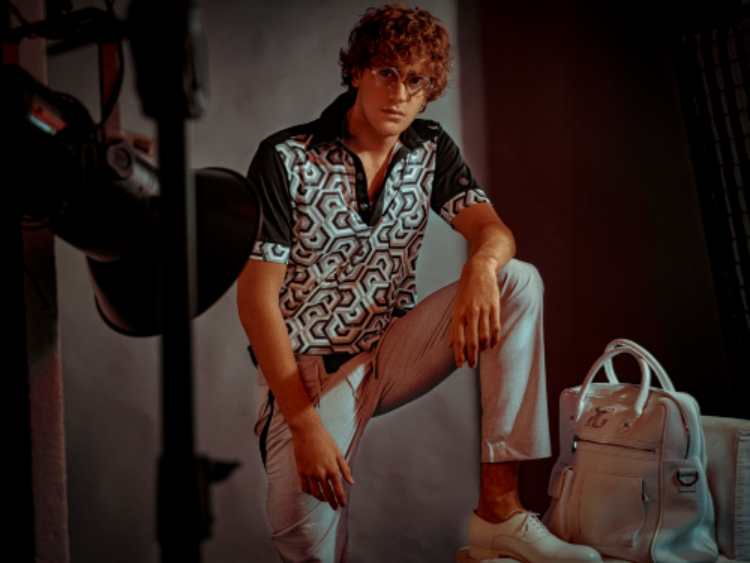
Is there a person who has been instrumental in making you who you are today?
I was very fortunate to have met many amazing people along my path, who in one way or another positively contributed to my life. I have lived in so many and diverse places, I have travelled to many worldwide destinations that I feel a citizen of the world. This definitely made me stronger and more creative. Fortunately, I could always rely on my internal drive throughout the many encounters and changes in my life. That strength and determination that fuels you in the achievement of your goals. That drive that makes you fearless and determined that you are, in fact, doing the right thing. I think the key is inside us.
Do you remember a particular moment in your career when you thought, ‘I’ve worked so hard but it’s worth it?’
Everything I’ve done in my career has been the product of hard work and passion so I could never regret it.
Today we talk more about sustainability, in what can Angelo Galasso be defined sustainable?
Angelo Galasso is a sustainable brand because we don’t use any kind of mass production. All our garments are made exclusively in Italy and in small artisanal workshops. We do extensive background checks to ensure these workshops respect health and safety standards. We also operate a ‘zero-waste’ policy, we only buy fabrics based on the actual meters we need to maximize efficient production and minimize waste.
Tell us about a socially responsible project Angelo Galasso got involved
We are always happy to give back and recently we entered into a very exciting partnership with Bervann Capital, a NY investment company leading a global ecosystem of investors. In March 2020, Bervann Foundation, the non-profit arm of Bervann Capital, launched the Corona Opportunity Fund, to support local and foreign governments in the fight against the COVID-19 global pandemic.
To support this worthy cause Angelo Galasso is producing a short film about the brand and is gifting a very special Gold Sequin Blazer to be auctioned off at the Black Tie Online on 30th April. Funds raised at the gala will go towards Corona Opportunity Fund.
Can luxury and sustainability coexist?
Yes, as long as all ecosystem players abide by the same ethical and sustainability rules. All companies should care about their employees, the materials they use, the manufacturing processes and the impact each part of the process has on the environment.
How do you see the Angelo Galasso in 5 years?
I imagine having between 8 and 12 boutiques/houses around the world. We have a vision of defeating the globalization of fashion brands. We want every store to be unique in architecture, design and collections. The only common elements will be the logo the brand philosophy and exceptional customer experience, but we want every store to feel like it belongs to the culture of the place where it is.
How do you recharge? What do you do when you want to forget about work?
I don’t really have to switch off from work because for me what I do is my passion and my version of ‘having fun’ — I’m always working, even if I’m walking down the street or I’m at an elegant dinner, I always look for inspiration.
What would you have done differently if you knew then what you know now?
Nothing. Perhaps one thing, I would have made more mistakes because in those times I’ve grown the most, both personally and business-wise.
Last but not least, what should never be missing in a man’s wardrobe?
The classic shoe. Gassman used to say that we can tell how elegant and stylish a man is just by looking at his shoes. They are the first thing someone notices when looking at a stranger.
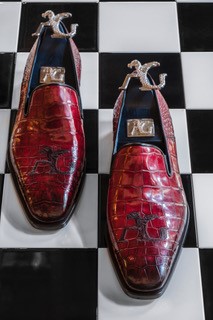
On 30 of April from 7 pm to 8.30 pm EDT, you can come to the Virtual Gala Event organised by Bervann Capital and Angelo Galasso, click here for your ticket
You can follow Angelo Galasso at @angelogalassoofficial
The WeGiveIt #WORLDCHANGERS series asks heroes, experts, and leaders to share their ambitions, routines and more.
We love to interview brands with purpose and listen about their work and their way of giving back. We can help businesses to optimize their Cause Marketing and their Brand Strategy.
I’m Clara Widdison from Mayor’s Fund for London and this is #MYCHARITY
This week on the #MYCHARITY series, we speak to Clara Widdison, from Mayor’s Fund for London, the charity who support young Londoners and promotes the activities which best increases their opportunities. The Mayor of London, Sadiq Khan, is their patron.
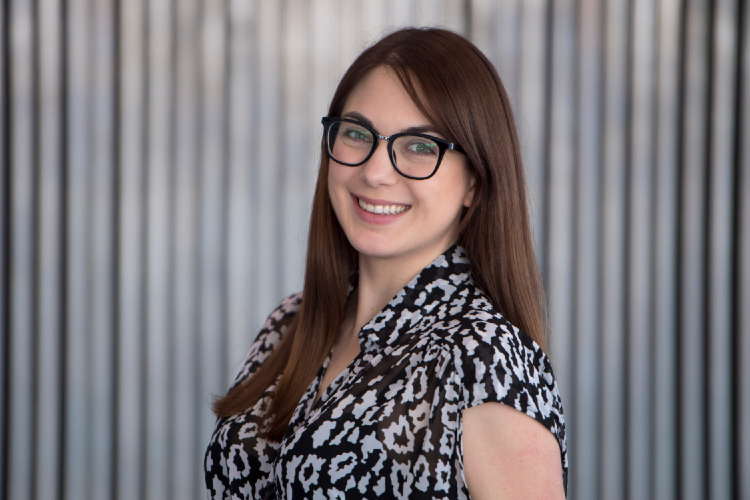
Location: London
Current job: Kitchen Social Programme Manager at Mayor’s Fund for London
One word that best describes how you work: Commitment
Current mobile device: Samsung Galaxy S10
Favourite website: Imgur.com
First of all, tell us a little about your background and how you got to where you are today.
I knew that I wanted to work in food when I left University, but I had no idea what roles were available or what my skill set would suit. I felt around blindly for many years – running a cookery blog, volunteering at food charities or coops and applying for jobs that seemed like they might be the right ‘fit’ (they weren’t!). Through a process of elimination, I understood what it was that I loved to do and how I could do it. One day I saw an article in a newspaper about a new social enterprise in the food sector. I rang them up and said ‘I have to work for you!’ That job changed my life.
Take us through a recent workday.
Kitchen Social is a pan-London program organised by Mayor’s Fund in response to holiday food insecurity. We work through one hundred grassroots organizations across London to get nutritious meals and enriching activities to children who may not have either otherwise.
Although this current public health crisis, the Coronavirus crisis, isn’t a school holiday, children from low income backgrounds are still out of school and at risk of hunger and malnutrition. The research we have done suggests that this applies to 300,000 children in London.
That’s why we’re continuing to help children living in food insecure households. At the moment I am speaking to our hubs about developing an emergency response to get food to these young people and their families. We’re also speaking to partners and families about supporting us to achieve this.
On a daily basis, we’re working with the Felix Project, FareShare and City Harvest to deliver food parcels to vulnerable families in London. We’re also working with Thomas Franks to make sure that children have fresh, healthy meals. If you’re keen to help, please consider donating to our appeal here: https://bit.ly/3a74VIp. Your support means that our Kitchen Social hubs can continue to provide packed lunches, hot food for collection & food hampers for those in need.
In the meantime, I am juggling my day job with caring for a toddler, and so the days are pretty manic at the moment!
How do you discover new ways to innovate in your working day?
At Mayor’s Fund for London we are constantly reviewing and reflecting on the work we do and how to improve and develop our model. We do that through feedback from young people and their families, our delivery partners and through engaging with the most up to date research. There isn’t a day that goes by when I am not tinkering with something – I think of myself as a social engineer.
What is the next big thing in the charity sector?
Sustainability! It’s been on the cards for years, but it is something we haven’t fully embraced as an industry. As funding becomes less available and more competitive, a lot of charities are looking for ways to become more self-sustaining. I come from a social enterprise background and I foresee that a lot of traditional charities will start moving into this space in the upcoming years.
How do you choose business partners to support the charity?
A lot of corporate partners want to work with us because we support children in the city in which they are based. We try to work with those who share our passion – getting great quality, nutritious food to children! We have brilliant partnerships with organisations such as Caravan Restaurants, Waitrose, Wahaca and Soho House.
Tell us about your favourite case history of the most successful partnership.
It’s so hard to choose – we really do have wonderful funders and sponsors. The restaurants are always so much fun to work with – they come along to our hubs and cook with our children and it’s an absolute joy to see the young people engage with new foods and the concept of professional cooking, some for the first time. We also have brilliant relationships with the surplus food providers in London, such as City Harvest and the Felix Project. They get great quality food into our hubs, and our hubs turn them into delicious meals for children.
How do you recharge? What do you do when you want to forget about work?
Rarely do I want to forget about work. I went into the charity sector knowing that I would have to sacrifice large pay checks, corporate perks and a glamorous career – instead I get a real sense of joy and pride in what we all do.
Sometimes to destress, I will cook at home, often for friends or family, whilst listening to questionable music very loudly. My toddler is always first in line when I am making banana pancakes.
What are you currently reading, or what’s something you’d recommend?
Nowadays I don’t get much time to read – my toddler sees to that! I have a huge pile of books on my bedside table that I am constantly promising to pick up. My favourite thing to flick through is cookbooks. I don’t follow recipes when I cook, but I love the photography and the inspiring ideas. Plus I can pick them up and put them down without worrying about forgetting the storyline!
Fill in the blank: I’d love to see _____ answer these same questions.
There are so many people in this sector that I find inspiring. It would be great to hear more from the female powerhouses leading the movement for a better food system such as Anna Taylor from Food Foundation , Kath Dalmeny from SustaIn and Kemi Akinola from Be Enriched.
What’s the best advice you’ve ever received?
My former boss gave me so much great advice. He really shaped who I am. One piece of advice that sticks with me is “This too shall pass.” Whenever I have a tough day, I recall this, and I know there is a much brighter one on the way. It seems a fitting piece of advice for our current situation.
You can follow Mayor’s Fund for London on Instagram @mayorsfundforlondon
The WeGiveIt #MYCHARITY series asks heroes, experts, and leaders to share their ambitions, routines and more and it’s published on WeGiveI Blog.
I’m Alex Wallace from Mintridge Foundation and this is #MYCHARITY
The WeGiveIt #MYCHARITY series asks heroes, experts, and leaders to share their ambitions, routines and more and it’s published on WeGiveI Blog.
This week on the #MYCHARITY series, we speak to Alex Wallace, Founder of Mintridge Foundation
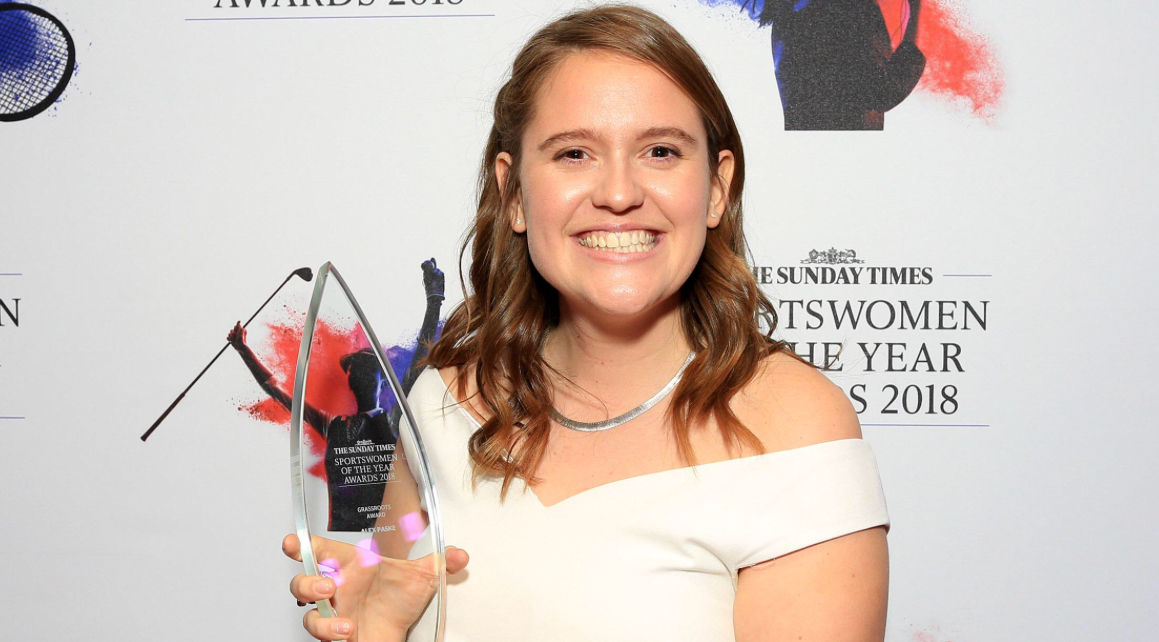
Location: Corby, Northamptonshire
Current job: Founder & Managing Director
One word that best describes how you work: Meticulous
Current mobile device: iPhone 8
Favourite website: https://www.thetimes.co.uk/ , https://herspirit.co.uk/
First of all, tell us a little about your background and how you got to where you are today.
I started Mintridge Foundation five years ago because I needed help myself as a teenager. I was awarded the 2018 Sunday Times Sportswomen of the Year in the Grassroots Category, the Women of the Future Sport Award in 2017 alongside Dr Sarah Leiter, an Associate Fellow of the Royal Commonwealth Society.
First I was a committed hockey player, but missed out on getting into the England team at the final stage. I had a huge crash of confidence and felt my identity was under threat. I really struggled with what I perceived as failure. All I needed was someone to tell me that I deserved to be there.
As a result Mintridge Foundation is now a registered charity, working with over 50,000 young people. We work for enhancing life skills in young people through sport. We provide a support network for young people by harnessing the power of positive sporting role models.
We assists young people of all ages, abilities and physical capabilities to develop confidence and resilience. Moreover we create awareness of the importance of mental and physical wellbeing through sport. Our team of Ambassadors – Olympians, Paralympians and other professional sports work with young people in schools, clubs and academies across the UK. Starting with visits including assemblies, coaching clinics and classroom sessions tailored to each organisation’s requirements, our ambassadors can then provide one- on- one remote mentoring in a safeguarded environment.
Take us through a recent workday.
No work day is the same at the Mintridge Foundation!
Just before 08:30, I caught up with Katie Smith, my colleague who is out. Katie is delivering a Mintridge Bronze programme in Brighton with one of our England Netball Ambassadors. Then I make a phone call with a technology company for an update on progress. We have recently received funding to help improve the quality and safeguarding of the remote element of our programmes.
I soon headed off to a local business to share more about our charitable work to see if we are able to become an official charity partner. I returned to the office to prepare a number of proposals for schools. School are interested in some of our Ambassadors leading a mentoring programme at their venues. A volunteer has recently offered her services for National Workout and Wellbeing Week and we put the final touches together for our Vinyasa Flow fundraising sessions before launching it online.
All before rushing out the door for a game of tennis! Perfection!
How do you discover new ways to innovate in your working day?
I love to share ideas with other individuals and charities in the sector through forums and networking.
What is the next big thing in the charity sector?
Our charity Mintridge Foundation! We are a young organisation that has huge aspirations to be affordable and recognisable to every school in the country. SportValue Bank is going to be incredible for us moving forward to help demonstrate our impact to funders.
How do you choose business partners to support the charity?
Business Partners are selected that share our values in enhancing life skills for ALL young people through a diverse team of sporting role models. We like to be able to work with organisations in whatever capacity they choose, however big or small and we want to be able to support them just as they do for us.
Tell us about your favourite case history of the most successful partnership.
I would say Squadkit has been one of our biggest supporters and corporate partners and, when you see their core values of participation, wellbeing, commitment to yourself and your team-mates, endurance and fun, it’s easy to see why.
To explain better Squadkit is a local business based in Oundle and they are the leading sportswear brand for independent schools nationwide. Therefore, they understand the requirements of growing bodies, specialist kit and (as we’re sure many parents are thankful for) durability. Their kit goes through development and extensive testing with professional athletes (and the washing machine too).
They are really great as they believe in environmentally responsible, ethical trade and hold themselves to very high standards with regards to this. As if that wasn’t enough, Squadkit has now turned their attention to female sports participation, particularly in teenage girls. developing the Limitless sports bra, addressing the issue of high numbers of teenage girls dropping out of sport.
Through our partnership, we have been able to impact 2,052 students in thirteen different schools since March 2019 delivering our Silver and Bronze programmes with a wide range of athletes, including tennis ace Jade Windley, netball superstars Pamela Cookey and Eboni Usoro Brown, diving Olympian Becky Gallantree and Paralympian archer Danielle Brown. Our partnership in Squadkit Scholarship Programme deliver Squadkit core values and corporate social responsibility, as we move into 2020, with their new Ambassador Programme too!
Because Squadkit has done a huge amount for Mintridge, we are incredibly grateful. If you have seen our new, redesigned logo and website, this is thanks to Squadkit.
How do you recharge? What do you do when you want to forget about work?
Mostly I find it very difficult to relax, I have lived and breathed the world of Mintridge for the last 5 years and I am so passionate about it, I therefore really struggle to switch off.
As all of our elite athlete Ambassadors tell us on a regular basis, they schedule R&R into their training schedules, and they wouldn’t be able to compete and succeed at the very top without it.
Therefore, I am taking their advice and gathering perspective – being as kind to myself as I am to others by:
Spending quality time with the supporting people that I surround myself with.
I take my 3-year-old nephew to football every Monday as the little things are the very important things and they keep me energised.
I play tennis at a local club.
I cycle and run without the use of apps (I put too much pressure on myself with PBs otherwise!).
I love doing a SuDoku in the evening to remove the temptation of overusing technology.
I enjoy a few glasses of wine with good friends!
What are you currently reading, or what’s something you’d recommend?
Probably I would choose Love for Imperfect Things: How to Accept Yourself in a World Striving for Perfection and Mud, Maul Mascara: How I Led My Country and Lived to Tell the Tala
Fill in the blank: I’d love to see ______ answer these same questions.
Because I admire her, Sophia Giblin, Clear Sky Charity
What’s the best advice you’ve ever received?
Above all my favourite is “Find something that is more important than you and devote your life to it.” by Pinky Lilani CBE DL
We can help you to optimize your Cause Marketing, enhance your Brand Presence and give you targetted education with our Marketing Workshops.

